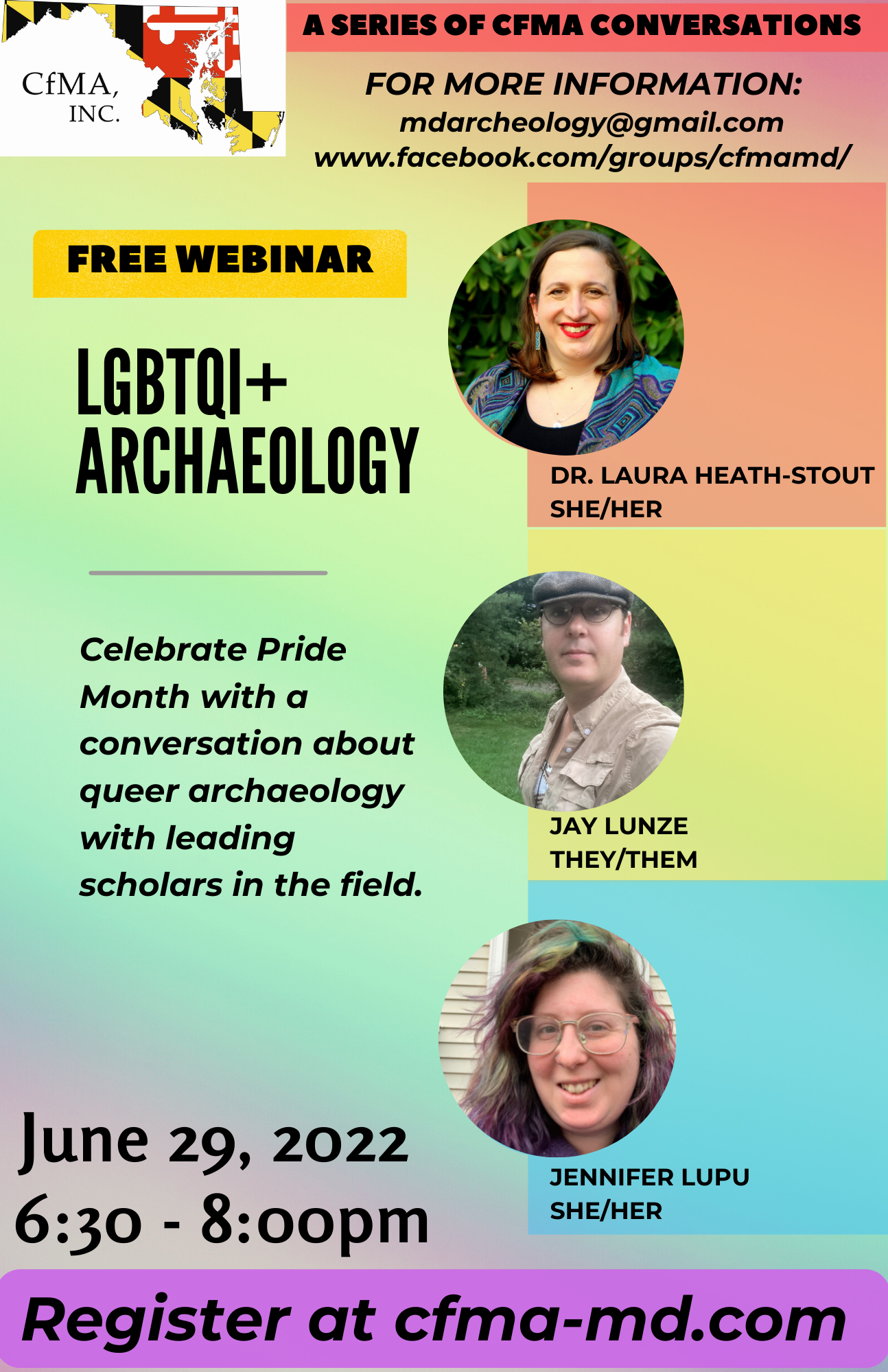In April 2022, The Council for Maryland Archeology (CfMA) launched a year of free webinars called “CfMA Conversations” with a presentation on "Accessible Archaeologt at Barwick's Ordinary". Join us during Pride Month, for the second installment in our series on June 29, 2022, from 6:30-8:00 PM with a panel of experts exploring queer archaeology. Don’t miss this fascinating discussion about the personal triumphs and struggles of LGBTQI+ professionals currently working in the field, intriguing discoveries made when examining archaeological sites with a more inclusive lens, and collaborations developed to promote queer heritage. Panelists include Laura Heath-Stout (she/her), Jay Lunze (they/them, she/her), and Jennifer Lupu (she/her) and the moderator will be Sarah Janesko (she/her).
To register for the webinar, please click HERE.
 |
Jennifer Lupu (she/her) is an archaeologist doing community-engaged research using archaeological collections from Washington, DC. Her work seeks to complicate the idea of a “typical” heteronormative household, demonstrating instead that historical Washingtonians lived in a myriad of types of households, family structures, and living situations. People who today might identify as LGBTQ+ have existed throughout the past, far before those specific labels existed, and have largely been erased from American history. As a queer person herself, Lupu has engaged with LGBTQ+ individuals through public conversations with stakeholders, open lab days, and creative workshops. She asks, What does it mean to be queer/trans in the past? How far into the past does queer community extend? Does queer heritage exist and if so how do we recognize it? How can we respectfully and accurately tell the stories of gender nonconforming and nonbinary people in the past? Her archaeological research has included studying the 19th century brothel neighborhood in Washington, DC and the Halcyon House site, where a drag ball scene may have occurred during Prohibition. Jennifer Lupu is completing a doctoral degree at Northwestern University, and she is a fellow of the Spatial Archaeology Residential and Online Institute (SAROI) at University of Arkansas, Fayetteville. Previously, she was an archaeological intern at the DC Historic Preservation Office, a predoctoral fellow at the Smithsonian Institution's National Museum of American History, and a visiting scholar at the Hannah Arendt Center at Bard College. During the 2022-2023 academic year she will be teaching in Gender and Sexuality Studies at Northwestern University. Jay Lunze (they/ them, she/ her) holds a BS in Geology with a minor in Anthropology from the College of William & Mary. Their undergraduate thesis was entitled, The Distribution, Morphology, and Chronology of Rusticles from the Confederate Submarine H. L. Hunley. They earned a social science and history humanity board reviewed Cand. Mag from the University of Southern Denmark with dual supervisors, the late Dr. Prof. Thijs Maarlevled Chair of the Department of Maritime Archaeology and head of UNESCO ICUCH social science publication review of Northern Europe, and Dr. Fred Hocker Director of Research for the Vasa Museum in Stockholm Sweden, presently a board member of the Chesapeake Bay Maritime Museum. Their Cand. Mag thesis was entitled, Time Aboard the Swedish Warship Vasa. Jay was the founder of the Virginia Maritime Heritage Society & Conservation Association which would later be adapted and modified by Dr. John Broadwater, Dr. Carol Nash, Dr. Elizabeth Moore, and Brendan Burke into the Virginia Maritime Heritage Chapter of the ASV. They presently work for the Ottery Group as a field archaeologist and archaeological technician. They are active in supporting LGBTQI+ inclusion into the fields of archaeology, maritime archaeology, maritime history, and the history of science and technology. They actively mentor LGBTQI+ and heteronormative students in these fields. Jay is active in helping LGBTQI+ victims of sexual assault/ rape and hate crimes through various social networks. Jay advocates for the ethical treatment of Intersex children and has helped others who have undergone unnecessary genital examinations, unwarranted surgical procedures, as well as supports those Intersex people who feel isolated by the dominant stance of Intersex rights organizations statements that they are heteronormative which is not how the entirety of the community feels and identify. Jay is Intersex, Transgender, and Genderqueer (transfeminine non-binary). Jay uses they/ them pronouns in professional settings. Jay allows friends to use she/ her pronouns. Laura Heath-Stout (she/her) is a settler on Massachusett and Pawtucket lands, and a Wenner-Gren Hunt Postdoctoral Fellow in Anthropology at the University of Massachusetts Boston. Her book, Identity, Oppression, and Diversity in Archaeology: Career Arcs is under contract at Routledge. She enjoys reading feminist science fiction and fantasy, vegetarian cooking, hiking, ranting about systemic injustice, board games, and hanging out with her partner and baby. |